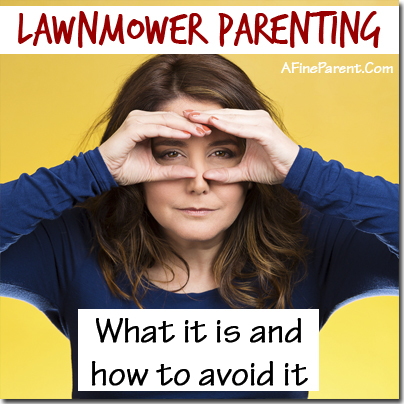 Lawnmower parenting.
Lawnmower parenting.
Isn’t it a cool term? Wait till you know what it means.
Lawnmower parenting is when parents turn into ninjas for their children and mow down every obstacle or challenge that could possibly occur in their lives so that their precious little ones don’t have to face even a tiny bit of discomfort.
Of course, it is only natural for parents to be protective of their children and to shield them from problems. But this instinct itself turns into a problem that could rob the children of their resilience. You and I have done it, albeit unknowingly, in our earnestness to give our children the best possible upbringing.
Still in denial, aren’t you? Let me give you a hypothetical situation: Betty has joined the school-carol team this year. The team is participating in an inter-school choir competition to be held in the city’s town hall with at least 200 people in attendance.
It is a day-long event. The school is taking care of the children’s meals and transportation from the school to the venue. All Betty’s mom has to do, along with other parents, is drop off Betty at school at 8am, come to the venue herself at 3pm, enjoy the program and pick up her daughter at 5pm.
And yet, there she is, hovering over her daughter, carrying waffles — her favorite breakfast — covered in aluminum foil. Obviously, this will make her happy and result in a great performance, even in a group! And moreover, kids are always sharing their food. What if she doesn’t get to eat much?
Betty is also hovering around with water because…children always forget to drink enough water! What if she gets hiccups in the midst of the performance?!
Does this sound familiar? We have all done this to varying degrees and levels. Betty’s mom’s concerns are well-intended, but isn’t she robbing her child of her enjoyment? Even if she eats a little less on that day, would it matter?
But in these moments, we have our blinkers on and just cannot see any fault in our actions. Now, imagine little incidents like this occurring every day, under different circumstances, and how it gradually impacts the child’s persona.
I have seen children brought up in a range of different circumstances and how it can impact their personalities. You see, I am a biological mom to two kids – a daughter who is almost fourteen and a son who is almost seven. I also have eight nephews and nieces, the children of my four elder sisters. Being the youngest in a big family with a lot of age difference between the siblings, I became an aunt when I was barely three years and now, at 38, I am a grand-aunt to a couple of kids who are older than my own children!
It was hugely embarrassing to be called an aunt by people of my own age, a sister to ladies who were old enough to be my mother (I know I am being mean here, but please, cut me some slack for being bullied for more than two decades!).
Now that I am settled well in my adulthood with my belief that everything happens for a good reason firmly in place, when I look back, I only see what a treasure trove of knowledge on parenting that I have gotten. After all, I got to observe five sets of parents (including my own) from very close quarters with varied approaches — from overindulgent to moderate and downright aloof.
This is precisely what has made me choose this unique and less-explored topic of lawnmower parenting — or in other words, how much indulgence is too much when it comes to raising kids.
Here are some suggestions on when to stop yourself short of going all the way to pamper your little (or not so little) cubs, albeit with a heavy heart.
#1. When your kid is five but still doesn’t eat her food unless you coax or even bribe
 I used to obsess over my daughter’s (lack of) eating habits, way past her toddler-age. She was an angel, always on her best behavior especially in public, very courteous to everyone who spoke to her, right until it was meal time.
I used to obsess over my daughter’s (lack of) eating habits, way past her toddler-age. She was an angel, always on her best behavior especially in public, very courteous to everyone who spoke to her, right until it was meal time.
It was as though the sight of food brought out a feral creature from within her and would even result in her bawling her eyes out. After about an hour of my relentless coaxing and efforts, she would manage to eat about five spoonfuls of food with both of us too exhausted with our respective ordeals to take it any further.
This continued well into her prep school, with her hardly eating anything from her lunchbox. As she had begun to study the importance of food for the body and mind and the benefits of each type of food, I felt it was time for me to step back from active indulgence when it came to her eating habits.
It was heart-wrenching to see her go without food except milk for two whole days, but it did make her experience hunger, probably for the first time in her life, and explore the different tastes and the satisfaction that a balanced meal gives.
 In short, it was good for her to have this independence and figure things out for herself. Now, at fourteen, she is a mindful eater who makes me shed tears of pride and joy with her elocutions on the benefits of a balanced meal.
In short, it was good for her to have this independence and figure things out for herself. Now, at fourteen, she is a mindful eater who makes me shed tears of pride and joy with her elocutions on the benefits of a balanced meal.
Here is what I now practice everyday, at least during dinnertime, to hold my lawnmower parenting at bay:
- Meal time is family time. We make it a point to sit around and have the meal together.
- I’ve stepped back and allowed my kids more flexibility on portion sizes and how much they eat.
- I involve them in preparing salads and in garnishing the food which makes them feel they almost prepared it themselves. It makes them savor the food.
- If the meal is finished without major fussing, we go for a stroll and I am all ears when they tell me every little detail about how their day went. Turns out that I enjoy this time as much as they do. We are giggling helplessly by the time we hop into bed.
#2. When your kid is procrastinating on a project that you are tempted to do yourself to save her the trouble
 When I was in Class 6, I happily enrolled myself to participate in a science expo, which was all about creating live scenarios and explaining the processes to the audience. Our group was given the topic of how clouds form and then cause rainfall, and we had to prepare all the gadgetry, assemble everything and simulate the actual process.
When I was in Class 6, I happily enrolled myself to participate in a science expo, which was all about creating live scenarios and explaining the processes to the audience. Our group was given the topic of how clouds form and then cause rainfall, and we had to prepare all the gadgetry, assemble everything and simulate the actual process.
The reality dawned on me when the work was being divided and distributed within the team. It was humongous, and I ran home in distress to my dad, expecting him to set it all up for me.
My dad sat me down, explained the process, brought study materials to reference and calmly left for the place he was due to visit the next day. It was nerve wracking for me, and I am sure he felt it too, but still thought the better of holding my hand when he knew it would be better for me to figure it out myself.
That project went on fine, and so did many more in the subsequent years when I knew I had to fend for myself, while also knowing that my dad watched from a distance, pitching in only to the extent of guidance and course-correction.
I remember this whenever I’m tempted to help my own kids a little too much with their school projects.
#3. When your kids are faced with a challenge and you feel they might fail
 I am sure you are nodding in agreement with me when I say that no amount of planning will prepare you for those moments that spring up in your face when you expect them the least. After all, what is life if not dynamic?
I am sure you are nodding in agreement with me when I say that no amount of planning will prepare you for those moments that spring up in your face when you expect them the least. After all, what is life if not dynamic?
But those moments could also let you glimpse the grownup that your munchkin is going to be if you just allow him to step forward and act while you twitch your fingers and your skin goes prickly.
You want to be a lawnmower parent in these moments, but just hold yourself back and observe what he does. Nine times out of ten, kids end up doing splendidly for themselves and also own up to the responsibility like the pros that they will grow up into.
I can cite many examples here — when a preschooler forgets to clean his white shoes before a particular event in school for which he needs to wear them in pristine condition, dabs them with wet chalk and gets by; a girl in class 3, in a bid to join her best friend in the school’s choir team, practices really hard and convinces her music teacher to take her in; the unexpected but heartening acts of kindness and empathy our children do towards fellow beings, through which they both give and gain strength from one another.
Trust life to throw curve balls without sparing anyone. As parents, you and I give unbounded love and care to our little ones and want to protect them against all odds. But it is equally important to ensure that they are equipped to conduct themselves with responsibility, grace and dignity even when we are not around.
In today’s competitive and highly ambitious world, nurturing mental health is extremely important. As adults, our children should be confident and have high self-esteem, be able to deal with stress, bounce back from any kind of adversity and most importantly, lead a life of contentment.
In an article published in NBC News, child psychologists say that when parents are overprotective of their children and set out to remove every obstacle that may come their way, they are inadvertently communicating to their children, “You cannot handle things on your own; you will fail. Let me do it for you,” or, “If I am not around, what will become of you?”
This could lead to low confidence levels and anxiety issues in children. I have personally seen students who score top grades in their classes dart nervous glances at their parents when asked simple questions in public, willing their parents to answer, which they usually readily do.
 So, take just a step back once in a while and watch your little one bring out those qualities of strength, fearlessness, resolve and empathy from within, and remember that it was you who so lovingly planted the seeds of those traits not so long ago.
So, take just a step back once in a while and watch your little one bring out those qualities of strength, fearlessness, resolve and empathy from within, and remember that it was you who so lovingly planted the seeds of those traits not so long ago.
At a small playground in our locality, a group of about twenty children, aged ten to fifteen years, gather almost every evening between 8 p.m. and 10 p.m. to play football or badminton or just hide-and-seek.
When I learned about it, I took my six year old, who was very excited but also very nervous, introduced him to the group, requested them to let him join them and sat in a corner with my book. Out of the corner of my eye, I saw that for about half an hour, my son, mostly ignored by the group, stood helplessly, making feeble attempts to get the ball when it went out of bounds. As much as I really wanted to barge in, give an earful to the kids or grab my son’s hand and march out of the playground, I stayed put, twisting my hands.
After about an hour or so, I saw an older boy beckoning to my son. The group surrounded him and started asking him questions and he would reply to them shyly. Before long, he was nudged to take a right fullback position (I think that’s what it is called!) along with that older boy.
It has been a month since that day, and my son has mingled with the group so well that they call him a silly name (being the youngest in the group) and he beams with pride. So do I.
 Here are some pointers that us parents can use for balancing between being protective and giving leeway to our children:
Here are some pointers that us parents can use for balancing between being protective and giving leeway to our children:
- Start treating them like young adults — I mean, you shouldn’t treat them totally like adults, but once in a while, buy them that hideous piece of clothing that they are drooling over (who knows why!). Kids are, after all, little humans and not just their parents’ extensions.
- Take their advice on trivial issues (which do not make much difference to you either way). It thrills them to bits. I ask my daughter what color she thinks I should wear for my next supermarket visit.
- Teach them to be courteous and say please and thank you. It is best to start young.
- Maintain basic hygiene. This just cannot be compromised, and it can help them learn the responsibility they need in other aspects of their lives.
- Expect them to take responsibility for their belongings and their safe keeping.
- Allow them to respond themselves if they are greeted or talked to in public. Do not justify their answers right then and there.
The 2-Minute Action Plan for Fine Parents
Take a few minutes to reflect on these questions to help you avoid lawnmower parenting in the future.
- Most of us adults have the habit of reflecting on the events of the day before going to bed. It is important to look back on the day and check our behavior for how we dealt with our kids during the day. When you go to bed tonight, think back on your day. How did you react to your kid(s)’ actions and behaviors during the course of the day? Unless it concerns the child’s health and protection, there should not be any stress or undue worry in our minds about the child. If there was, make a correction in your mind and commit to not repeating that situation again the next day.
- What are the different ways by which you could stop yourself from jumping into the so-called “rescuing act” (in cases where the issue doesn’t concern the child’s primary health and safety)? One idea might be to count to ten when you find yourself tempted to act too fast. Come up with a list of strategies that work for you.
- How can you bring happiness and stability into your life as a parent? Resolve to be happy no matter what. There is a lot of evidence that happiness is a state of mind and does not necessarily depend on the external circumstances. But a happy person exudes positive vibes, and children are like sponges when it comes to imbibing their parents’ behavior! A joyful parent with a stable mind is less likely to get into “lawn-mowing mode” than an anxious and jumpy parent.
The Ongoing Action Plan for Fine Parents
It takes a lot of patience on our part to watch our kids stumble, throw fits and tantrums and falter. In those moments, it’s hard not to be a lawnmower parent, mowing down obstacles for our children.
But it is as important for them to fight their own battles as it is for them to get those immunization shots they cried about when they were babies. It is best for them to learn to work their way out of situations themselves, under our watchful but distant supervision.
You know, there is a famous song in the folklore of the place where I come from. It is a song about a child communicating to her mother, and it loosely translates to something like this:
Mom, I know you care for me, but your protectiveness makes me sometimes feel like a fish trapped in a net or to a hook. I know you want me protected from all the wicked ways of the world but please allow me to see, smell, touch, taste and swim in this beautiful lake called life! After all, I won’t drift apart or lose sight of you when I am but surrounded by your loving care and blessings!
Beautiful, isn’t it? Just knowing that it was written hundreds of years ago makes us feel proud of our past generations. They may not have had the best of resources that we enjoy today, but they had that wisdom of when to actively get involved in their children’s lives and when to just make it known that they were there if needed.
Isn’t it because of that kind of upbringing that we have turned out to be these wonderful human beings full of love and empathy?
So, go on, become a good sounding board and a great comfort and support when your kid needs it, but allow them to create their own life experiences.
I think it is very good for parents in teaching their children, this is also a pretty good topic, offering ways to help parents recognize what is wrong in their children’s education.
I think it will be very useful for parents to teach their children a great topic, everything will be better if parents read this article to educate their children in the best way possible.
Thank you for your kind words Dustin.
Wow Ranjani, this is an excellent article!!! Very well written and articulated !!!
I aways considered myself as a “Cool Mom” who knew how to balance between the fine line of giving kids their independence and also holding back only occasionally when really really needed.
But, your article indeed opened my eyes . As i read through the various scenarios you have so aptly described, i caught myself being guilty :-). I realized that , at times i indeed have tried to mow the lawn and clear out weeds out of my kids way to ensure that they had a smooth green lush garden (a.k.a life) to play. In the hindsight i now know that i could have been hands off in some situations.
Thank you for such a great eye opening article . Looking forward to see more such insightful articles from you !!!
Thank you for your kind words, Savitha. It means a lot.
Very nice article. Very well written.
Coming from a similar background, I can relate to Ranjani’s experiences.
I am wondering if Lawnmower Parenting is in some ways similar to Helicopter Parenting.
I and my wife try our best to let our kids learn from their own experiences. The key factor, I think is, to encourage the kids to make mistakes and build confidence in them.
Thank you for liking the article Karthik. You are an amazing parent as can be seen on the joyful faces of your kiddos.
Good article. I agree to some of your points and differ somewhere too. As I believe that removing huddles for kids is nothing wrong if you are able to make them understand and see their growth next time in those or other situation. It’s always good to direct them and help them to build their personality and accept their success and failures.
Thank you for your valuable inputs Nikunj.
Highly useful, meaningful and need of the hour ! Author has left no stone unturned in making attempts to portray the reality of present day parenting.
Also she has neatly placed a pragmatic bouquet of suggestions coupled with an action planner to overcome the Lawnmower attitude.
I also recommend to make a small video which would help more parents to see the same.
Long story short, ‘Worthy Insights from this even though it is slightly lengthier’….Compounded value for your 10 mts
Thank you for your kind words Harsha!
Oh my gosh – I felt the article was truly speaking to me. Being the parent of an only child, who’s 5 years old, I want to do everything for her. Recently in her drawing class (which is on Zoom), I feel pressured to sit next to her and guide her word for word on how to draw, what colors to use, etc so I can get the perfect painting. I have learned my lesson now, and will do what you do on the playground next time. Hard for me, but promise to try my best 🙂
Who cares if it looks like an owl or not, she will learn it someday by herself.
Thank you for liking the article Viji. You are a great parent and your daughter will surely make you proud!
Very articulately worded Ranjani! It makes a lot of sense – it draws from the example of how “helping” a butterfly breakout of the pupa is not really a help at all…
Thank you for your kind words Anitha! That line captures the essence of the article beautifully!
Ranjini, the article is very well written and makes for interesting reading, covering a very important aspect of parenting. It is certainly a wonderful guide to all existing lawn-mowing parents 😊 and parents-to-be as well! Like you said, children will have their own views on many aspects of life, that must be respected. However just one more point could have been added in my opinion. That if the child fails to make it out of the “difficult” situation, or ends up getting embarrassed, the parent must assure the child that it is okay. It is not important to always emerge a victor, to do his/her best, and better than the last time. Instead of the common “I told you so…” when they fail😊
Thank you for appreciating the article Padma! When a child is encouraged to take tiny initiatives, the parent acknowledges the efforts more than their outcomes. It may not turn out as expected for the first couple of times much to the parents’ dismay but that is exactly when they have to resist the tearing urge to step in. Children are, by fault, resilient and undaunted!
Your article is very well researched and well written. This is something that we have all done at some point to some extent. I could relate to and understand all the examples as they were from your own experiences. This is a very relevant topic and your article will surely help many other parents to adjust their ways of parenting their children. 😊
Thank you for your kind words Debjani!
Dear Ranjani, Your article makes loads of sense in today’s world where we as parents have parent identity crisis. always tottering on the thin line between being a traditional parent or a good friend. On reflecting upon your article, I realise that in bein the lawn mower parents, we raise individuals who feel entitled to help , service and support from others in both personal and professional situations thereby the sense of gratitude lessens and they get disappointed more often.
Thanks for a new perspective.
Hi Sonia, thank you for reading and liking my article. I couldn’t agree with you more on the constant scepticism that we all face in today’s times on whether to be a parent-parent or a friend-parent!
Thanks very practical information.
Thank you Annette!
Dear Ranjani,
Your article is an eye opener , we think we are helping them cope with the situation in their life but it hurts them more than it benefits .
My husband and I have been lawnmower parents for the past forteen years . Is there still a chance that we might be able to get our son to take responsibility ? If yes then how ? Please help!
Hi Mubina,
Thank you for liking my article. I suggest you could start with asking for his suggestions on small things like the colour of his choice to paint a room in the house with or buying a piece of furniture of his choice. They stay around for a long time and keep reminding him subtly that he chose them. This will give him a sense of both pride and responsibility. Also, complimenting him on his mindful actions will go a great length in boosting confidence and shaping up his persona. Another device that I have personally found beneficial is to discuss about the little inconveniences you faced during the day with him. It not only makes them feel important and all grown up, the suggestions they can sometimes come up with will be mind boggling! Because their perspective will be dewy fresh and untainted by opinions or beliefs. So, go on and become teens all over again along with your son and enjoy! Do give my love and best wishes to your son.
Very nice advice loved it in true sense
Thank you D; am glad you liked it.